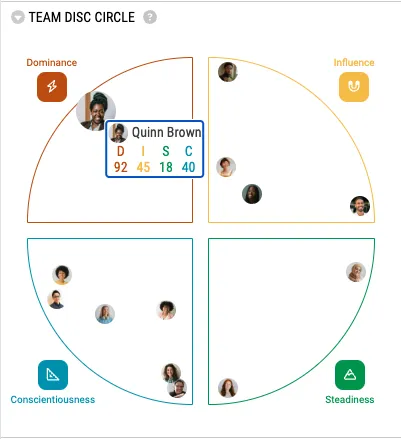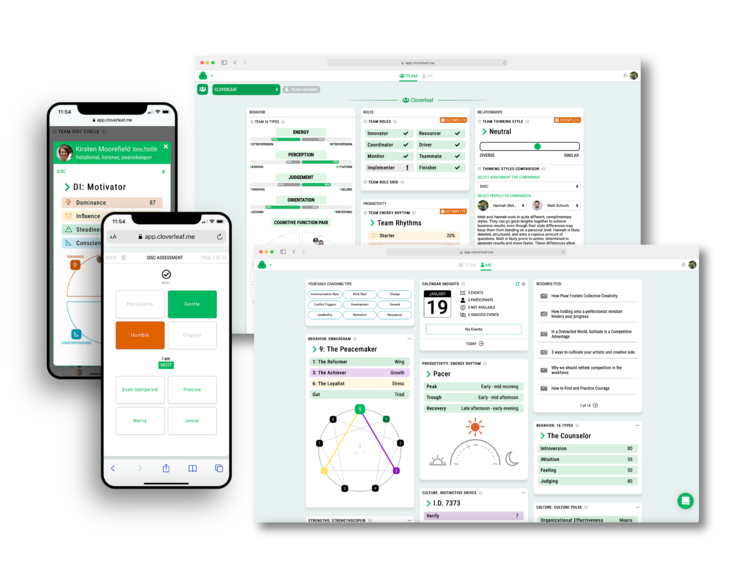The workplace is transforming at a pace that rivals even the most imaginative sci-fi epic (cue your internal Star Wars music), and with it, managers’ roles are becoming far more impactful. Gone are the days when management was about supervising tasks and enforcing rules.
Today’s landscape demands a shift towards a culture where every team member is “all-in”—empowered, engaged, and fully committed. This kind of environment isn’t just a nice-to-have; it’s a necessity for organizations that want to thrive in an increasingly competitive and unpredictable world.
But as talent development and organizational leaders, how do you lead this transformation? How do you move from traditional management practices to a coaching-focused leadership style that truly energizes your workforce? You know the importance of development, but the challenge lies in making it actionable and deeply ingrained in your culture.
In this article, we’ll break down the steps necessary to cultivate a coaching culture that emphasizes creativity, collaboration, and continuous learning. More than ever, your organization needs leaders who can coach, not just manage.
Transitioning to this new model can feel overwhelming, but it’s also a path filled with opportunities to unlock your teams’ full potential. We’ll explore what it takes to make this shift, including practical strategies to help you embed a coaching culture that meets and exceeds the aspirations of your people and your organization.

Leading Beyond Management: The New Case For A Coaching Approach
Coaching as a leadership culture isn’t just the latest trend—it’s a strategic evolution that forward-thinking companies have been adopting for decades. In industries where innovation drives success, like SaaS, startups, and scaleups, this coaching approach has surged in the last 10-15 years. Why? Because these companies understand that unleashing creativity, engagement, and growth within teams isn’t just an added benefit—it’s a non-negotiable for innovation and, let’s face it, profitability.
Top-down, command-and-control management styles do more than frustrate employees—they actively suppress high-potential talent and inquisitive minds. When employees are reduced to merely executing orders, their potential is not just capped; their engagement plummets. But the fallout isn’t limited to employees. Managers, under the constant pressure to make every decision, end up trapped in slow problem-solving cycles, leading to a lack of resilience across the board.
In a world where rapid change is the only certainty, these dynamics can cripple an organization’s ability to adapt and innovate. Transitioning to a coaching culture doesn’t just address these issues—it transforms them. By empowering employees to take ownership, encouraging critical thinking, and shifting managers from directors to guides, organizations cultivate a resilient, agile, and engaged workforce ready to meet today’s fast-evolving challenges head-on.
Ready To Create Behavior Change In Your Team?

Laying the Foundation for a Coaching Culture: Trust, Empowerment, and Transformation
Shifting from a traditional management model to a coaching culture is not just about tweaking a few practices but a deep, organization-wide transformation. Talent Development leaders already understand the need for this shift—they’re well aware of the benefits that a coaching culture brings. The real challenge lies in executing this transformation effectively within your organization. The real question is how to create the conditions for a coaching culture to thrive effectively.
Below, we’ll explore how trust, empowerment, and mindset transformation are the cornerstones of this cultural change. These elements aren’t just abstract concepts; they are actionable strategies you can implement as a leader to create a thriving coaching environment.
Whether your goal is to bridge trust across diverse teams, empower managers to step beyond micromanagement or reshape mindsets for genuine, lasting change, the following strategies aren’t just about theory—they’re about igniting real transformation. These are not just tools to add to your toolkit; they are catalysts for the cultural shift that drives innovation, resilience, and collective success in your organization.
Trust as the Cornerstone
You already know that trust is foundational to any coaching relationship, but how do you actively cultivate it across diverse teams? It’s more than just encouraging open communication; it’s about creating consistent, trust-building behaviors at every level of the organization. Leaders must model vulnerability, admit mistakes, and encourage others to do the same. Trust grows when team members feel psychologically safe enough to take risks and express ideas without fear of judgment or retribution.
Empowerment Through Delegation
Empowerment is a key to unlocking your team’s potential. But how do you ensure that empowerment isn’t just lip service? It starts with delegating meaningful tasks, not just busy work. Talent development leaders need to challenge their managers to step out of the role of the “heroic problem-solver” and instead become facilitators of their teams’ growth. Empowerment means giving employees the autonomy to make decisions and the support to navigate their challenges, knowing that they have the tools and backing to succeed.
Transforming Mindsets for Lasting Change
The shift to a coaching culture requires more than a surface-level change in behavior; it’s about transforming the underlying mindsets that drive those behaviors. This means moving away from a focus on correcting mistakes to one of continuous learning and development. Leaders must be equipped to coach not just for performance but for growth—helping employees not only meet current objectives but also develop the skills and mindsets they’ll need in the future.

Empower Your Organization For A Seamless Transition into a Coaching Culture
Transitioning from traditional management to a coaching culture is a significant shift that requires intention, strategy, and patience. It’s not about flipping a switch but about taking deliberate steps to create lasting change. The following steps will provide you with the tools and strategies needed to confidently embed a coaching mindset into your organization’s DNA, ensuring that this cultural transformation is as smooth as it is impactful.
1. Equip Your Leaders With Coaching Skills
Creating a coaching culture starts with empowering your leaders to become coaches. Think of it like training a team for a big game—you wouldn’t send them in without the right skills and strategies. It’s not enough for leaders to have management experience; they need specific coaching skills that align with your organization’s goals and culture.
To ensure this transformation happens at scale, consider the broader context in which your leaders operate. Training shouldn’t just be about isolated sessions but building a unified coaching experience that every leader can understand and apply consistently across the organization. This is where a common language becomes vital. When all leaders are trained with the same resources and tools, it creates alignment and ensures that coaching conversations are effective, no matter who is leading them.
Even seasoned leaders can benefit from focused coaching training. It’s about more than just a refresher; it’s about ensuring everyone is on the same page and ready to support their teams in a way that encourages growth and innovation.
Start by identifying the key coaching skills that are most relevant to your organization. These could range from active listening and effective questioning to providing constructive feedback. Once you clearly understand what’s needed, offer tailored training sessions that are practical and immediately applicable.
A quick win? Start small.
Incorporate coaching opportunities into your existing meetings or one-on-ones. For example, shift from telling employees what to do to asking them how they think a problem should be solved. This subtle change can start to build the coaching mindset without overwhelming your leaders or team.

2. Leveraging Technology to Make Coaching Sticky
Coaching doesn’t have to be overwhelming, especially when you have the right technology in your corner. The real transformation begins when you move away from traditional, infrequent performance reviews to more dynamic, ongoing coaching conversations. Tools like Cloverleaf make integrating coaching into your daily routines seamless and impactful.
Think of these tools as your real-time coaching assistant. With instant access to insights into team dynamics and individual strengths, you can tailor your coaching approach on the fly. Imagine having a continuously updated playbook that helps you adjust strategies to fit the unique needs of each team member. Cloverleaf’s real-time coaching tips and visual dashboards are designed to make this easy, providing a clear view of where your team is excelling and where they may need extra support.

The beauty of leveraging technology is that you don’t need to upend your entire process overnight. Start small by incorporating these tools into your existing workflows. For instance, before your next one-on-one, use a tool like automated coaching to review personalized coaching tips that are contextual based on the individual’s strengths and communication style. This approach not only enhances the effectiveness of your coaching but also demonstrates to your team that you’re deeply invested in their personal and professional growth.
How I Used Cloverleaf To Shift Leaders To A Coaching Approach
In a recent collaboration with one of my clients, we set out to transform their leadership culture by integrating continuous, personalized feedback into their daily routines. The goal was to move away from the traditional once-a-year performance reviews and instead create an environment where coaching conversations happened regularly and naturally.
We introduced Cloverleaf into their daily workflow to make this shift manageable and sustainable. Rather than overwhelming the team with a massive cultural overhaul, we implemented small, iterative changes that gradually embedded a coaching mindset into everyday operations.
Cloverleaf’s visual dashboard quickly became a game-changer. Leaders were able to pinpoint team strengths, identify skill gaps, and recognize opportunities for delegating tasks more effectively. The daily tips feature, integrated into Slack, prepared employees for their interactions, inspiring a coaching mindset across the entire organization. This approach allowed leaders to adapt their leadership style progressively, reinforcing the coaching culture without disrupting the team’s existing processes.
By equipping the team with these tools, we didn’t just initiate a shift; we laid the groundwork for a robust, all-in coaching culture that’s poised for long-term success.

3. Activate the Coaching Mindset
After equipping your leaders with the right training and tools, the challenge shifts to integrating coaching into the daily operations of your organization. This integration facilitates a mindset where coaching becomes a natural, ongoing part of how your teams function and grow together.
Start by establishing regular feedback loops, ranging from quick, informal check-ins to more structured one-on-one sessions. The goal is to normalize feedback as a routine part of your team’s day-to-day interactions, making it easier for team members to reflect, learn, and grow continuously.
Promoting autonomy within your teams is another crucial element. Empower your employees by giving them the freedom to take ownership of their roles and the support they need to navigate challenges. Recognize and celebrate those who exemplify the coaching culture you aim to create. Highlighting these coaching moments reinforces the desired behavior and motivates others to adopt similar practices.
When feedback, autonomy, and recognition are woven into the fabric of your daily operations, the coaching mindset can truly take root. This is how you cultivate an all-in culture, where every team member is engaged, empowered, and contributing to the organization’s success.

How To Ensure Your Coaching Culture Takes Root
Transforming your organization’s culture is no small feat. It’s easy to kick things off enthusiastically—through workshops, events, and all the bells and whistles—but what happens after the initial excitement fades? The true test of a successful coaching culture lies in its longevity and the tangible benefits it brings to your organization over time. – Marnie Robbins, Founder of Vibe People Studio
To ensure your coaching culture sticks, tracking its impact continuously is essential. As the saying goes, “What gets measured gets managed.” Here’s how you can systematically evaluate your culture’s evolution:
- Share Surveys: Conduct surveys regularly to gauge employee sentiment and engagement. These surveys will provide quantitative data on how your team perceives the coaching culture and whether it is creating a positive work environment. Are your employees feeling more empowered? Are they more engaged?
- Gather Feedback: Never underestimate the power of direct feedback. Creating open channels for dialogue allows employees to share their real experiences with the coaching initiatives. This qualitative insight can uncover underlying issues or highlight successes that raw data might miss. It also signals to your team that their voices are heard and valued.
- Conduct Listening Tours: Take a hands-on approach by organizing listening tours where leaders engage with employees across different levels and departments. This method helps bridge gaps between leadership intentions and employee experiences, ensuring that the coaching culture resonates throughout the organization.
- Measure Performance Metrics: Track key performance indicators (KPIs) such as productivity, innovation, and team collaboration. For instance, monitor how customer success scores correlate with employee sentiment. These metrics provide concrete evidence of how the coaching culture influences overall performance, linking cultural shifts directly to business outcomes.
Consistently reviewing these metrics will help you identify where your coaching culture is thriving and where adjustments may be needed. This ongoing assessment enables you to fine-tune your approach, ensuring that your coaching culture aligns with your organizational goals and drives genuine, sustainable success for your team.
Coaching: The Strategic Investment In Your Organizations Future
Adopting a coaching approach isn’t just about enhancing your people initiatives—though that’s a powerful outcome. It’s about aligning leadership strategies with the evolving demands of today’s business landscape. Companies that successfully integrate a coaching culture aren’t just keeping up with the times; they’re positioning themselves to lead, innovate, and thrive. When every team member is engaged, empowered, and contributes to a shared vision, the organization moves forward with a unified strength.
The journey toward a coaching-focused leadership model is more than just a shift in management style—it’s a strategic investment in your organization’s future. By investing in a culture where coaching is the norm, you unlock the full potential of your teams, paving the way for sustained success and innovation.
Do you want to see the impact of automated coaching for yourself? Schedule a Cloverleaf demo today to learn more about scaling the impact of your team coaching program.







